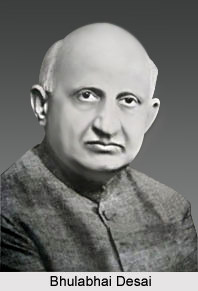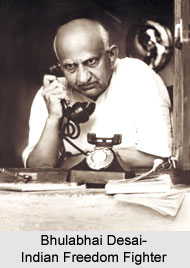 Bhulabhai Desai was one of the well known Indian freedom fighters and an independence activist. He was also an acclaimed lawyer. Desai is well renowned for his defense of the 3 soldiers of the Indian National Army (INA), who were accused of treachery against the British sovereign during the Second World War. Bhulabhai Desai also tried to negotiate a covert power sharing agreement with Liaquat Ali Khan, one of the leading founding members of present Pakistan, of the Muslim League.
Bhulabhai Desai was one of the well known Indian freedom fighters and an independence activist. He was also an acclaimed lawyer. Desai is well renowned for his defense of the 3 soldiers of the Indian National Army (INA), who were accused of treachery against the British sovereign during the Second World War. Bhulabhai Desai also tried to negotiate a covert power sharing agreement with Liaquat Ali Khan, one of the leading founding members of present Pakistan, of the Muslim League.
Early Life of Bhulabhai Desai
Bhulabhai Desai was born 0n 13th October 1877 in Valsad, Gujarat. He received his education from Avabai School in Valsad and later passed his matriculation from the Bharda High School in Bombay (now Mumbai) in 1895. While still in school, Bhulabhai Desai married Ichchhaben. The couple had a son named Dhirubhai. In the year 1923, his wife died of cancer. Later he got admitted in the Elphinstone College in Bombay and successfully completed his graduation in English literature and history. Bhulabhai Desai was honoured with the Wordsworth Prize and won a scholarship for becoming first in Political Economy and History. Then he completed his M.A. in English from the University of Bombay.
He was later appointed as Professor of English and History in the Gujarat College, Ahmedabad. He continued to study Law while he taught at the Gujarat College. In the year 1905, Desai was enrolled as an advocate at the Bombay High Court and eventually became one of the leading lawyers in the country.
Political Career of Bhulabhai Desai
Bhulabhai Desai started his political career after he joined the All India Home Rule League, led by Annie Besant. He also became a member of the Indian Liberal Party, which supported the influences of the British. But he opposed the all-European Simon Commission, which was established in the year 1928 by the British Government of India in order to devise constitutional reforms in the country. His association with the Indian National Congress Party started when he stood for the farmers of Gujarat in the inquiry by the British administration after the Bardoli Satyagraha in the year 1928. Bhulabhai Desai officially became a member of the Indian National Congress in the year 1930. He founded the Swadeshi Sabha with the aim of supporting the boycott of foreign goods. He aimed to build a boycott by Indian companies of foreign goods and thus persuaded eighty textile mills to join the movement. The British authorities announced that the Swadeshi Sabha unlawful and illegal and arrested Desai for his activities in the year 1932.
In November 1934, Bhulabhai Desai was elected to the Central Legislative Assembly from Gujarat. He took active participation in the Satyagraha which was initiated by Mahatma Gandhi (Mohandas Karamchand Gandhi). Under the Defense of India Act, he was detained by the British Indian Police on 10th December 1940 and was imprisoned in Yerwada Central Jail. Due to severe health problems, Bhulabhai Desai was released from Yerwada Central Jail in September 1941.
Desai Liaquat Pact
 Bhulabhai Desai initiated secretive talks with Liaquat Ali Khan, who was one of the most significant leaders of the Muslim League, about pressing demands for the release of political prisoners and members of the Congress Working Committee. He intended to negotiate an agreement for a future coalition government that would facilitate a united preference for Hindus and Muslims for the autonomous Government of India. Liaquat demanded the parity of Muslims to Hindus in the council of ministers and waived the demand for a separate Muslim state. Desai tried to create an ideal Indian alliance which would accelerate the momentum of the Indian independence while concluding the India freedom struggle. He worked on the deal without informing Mahatma Gandhi, Jawaharlal Nehru or any other Congress leader. Moreover Liaquat Ali Khan had also kept the deal top secret from his senior, Muhammad Ali Jinnah.
Bhulabhai Desai initiated secretive talks with Liaquat Ali Khan, who was one of the most significant leaders of the Muslim League, about pressing demands for the release of political prisoners and members of the Congress Working Committee. He intended to negotiate an agreement for a future coalition government that would facilitate a united preference for Hindus and Muslims for the autonomous Government of India. Liaquat demanded the parity of Muslims to Hindus in the council of ministers and waived the demand for a separate Muslim state. Desai tried to create an ideal Indian alliance which would accelerate the momentum of the Indian independence while concluding the India freedom struggle. He worked on the deal without informing Mahatma Gandhi, Jawaharlal Nehru or any other Congress leader. Moreover Liaquat Ali Khan had also kept the deal top secret from his senior, Muhammad Ali Jinnah.
Later in the year 1945, Bhulabhai Desai provided complete information to Gandhi about the Desai Liaquat Pact, but Muhammad Ali Jinnah and the Muslim League directly rejected any agreements. Moreover Liaquat Ali Khan denied any such pact was negotiated between them. Bhulabhai Desai did not receive a ticket to contest elections for the Constituent Assembly of India, as a result of the fallout of the Desai Liaquat pact.
Bhulabhai Desai and Indian National Army Trials
After the arrest of the 3 prime officers of the Indian National Army (INA), also known as the Azad Hind Fauj, namely Colonel Gurbaksh Singh Dhillon, General Shah Nawaz Khan and Colonel Prem Kumar Sahgal, they were put on trial for treachery. The Indian National Congress Party formed a Defence committee that constituted of 17 advocates, which also included Bhulabhai Desai. In October 1945, the court martial hearing started at the Red Fort and Desai was the leading counsel for the defense. He presented a resounding and zealous argument in defense of the charged Indian National Army soldiers.
Later Life of Bhulabhai Desai
Bhulabhai Desai died on 6th May 1946. Later the Bhulabhai Memorial Institute was constructed in Bombay (now Mumbai) in his memory.






